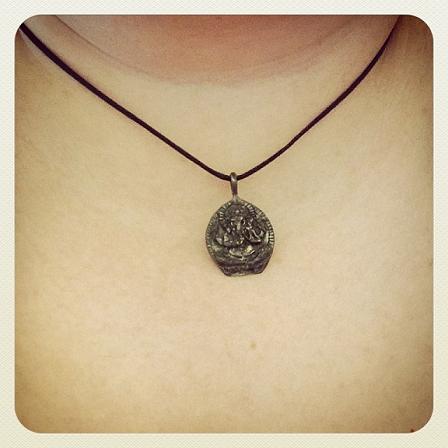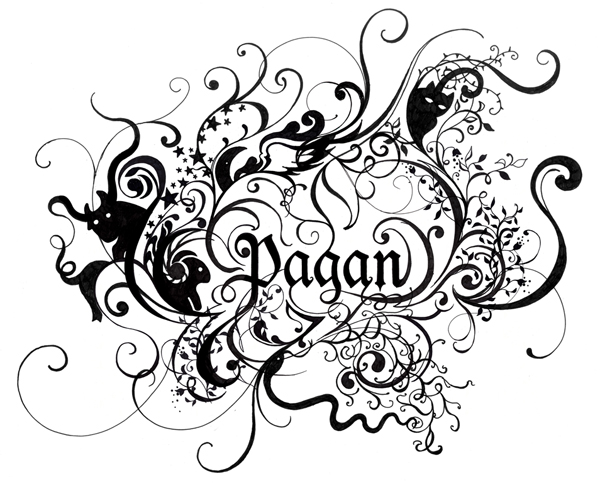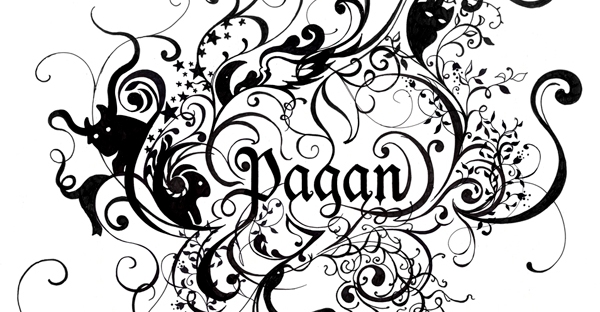My friend Vicky asked me to talk about what it’s like being a practicing Pagan on my own, “versus being part of a small community group, versus what [I] think it might be like in a really large community where Paganism is really prevalent and recognized[.]”
Solitary Blues
I was a solitary only Pagan for a very, very long time. Being solitary did nothing to help my natural laziness, and I rarely did anything. I rarely celebrated holy days/Sabbats, or full moons, or worked any magic. Now, I’m still technically solitary, but I also celebrate every Sabbat with a local group, and have lots of discussions, and my practice has been growing–slowly, but still growing–since I started hanging out with them. I think being a solitary only Pagan means being very self-sufficient, very organized, and not lazy. I, however, am very lazy and can organize other people but not myself. Self-sufficient is something I haven’t had much of a chance to try out yet. I think once I can live on my own, that will really be put to the test.
For me, being solitary meant being lonely, and feeling like information was available only in a storm of Internet chaos. Books are awesome, I love books, and I love the Internet, but when it comes to religion, spirituality, and worship, I firmly believe that books and the Internet will take you only so far. Eventually, one will need intellectual stimulation of the sort that can only come from other people. Even if it isn’t an official coven, grove, or other kind of group that actually celebrates together. A study or discussion group is just as valid.
Location, Location, Location
It is the truth that the area where I live has little in the way of a larger Pagan community. This is probably due to several factors.
The first would be that we are in the middle of the bible belt, and Christianity is not only the majority here, it is part of the vocal majority. I recognize that I am lucky to have never experienced any form of harassment personally for my religion. I haven’t been going around introducing myself to everyone as a Pagan, but I’m not exactly shy about it, either. Right now I wear a Ganesha necklace tied around my neck; it is short enough that I cannot slip it over my head, so it will stay on until the cord breaks. I also have a lovely pentacle that I wear on special occasions.

I’ve never been yelled at or otherwise harassed. The closest I can come is once being asked to wear my pentacle under my shirt by a place of employment, who stopped asking after I pointed out that they would never ask a Christian to wear their crosses under their shirts. I didn’t stay there much longer, anyway.
My point is that, while I haven’t had any experience with this, others have, and there are still plenty of Pagans who live in the “broom closet,” as it were, and there are a lot of them who live in my area. It’s not generally a place where one feels they can be open about their path as anything other than Christian. I’m one of the exceptions–though I am lucky enough to be friends with a few of the other exceptions. Me? I’ve never even seen the inside of the broom closet. It’s just not who I am. I’ll talk more about that in a different post.
So, what smaller groups there are here, tend not to come together for a larger Pagan community because we probably wouldn’t be welcomed by the non-Pagan community here, and coming together would make us more visible. (Now, I have my personal beliefs on this, which I will also talk about in that different post; for now let it suffice to say that I think that if we never show ourselves, we’ll always have to be afraid.)
The second thing I’m pretty sure keeps us from having a larger Pagan community here is that many of the “old guard” Pagans apparently have some sort of grudge between their leaders. I’m not privy to details, because I wasn’t there, and I think most of this happened when I was much younger anyway, but I have been told that there are people who will absolutely refuse to be in the same room with each other. They have scheduled events at the same time as each other, forcing others to choose between them. Petty things that have no business being part of religion or spirituality, but which always manage to find a way.
Then there are the younger people who can’t find a stable group or community here, and get it in their heads to start their own, but have no grounding in experience or fact and….
Well. At this point I’m hoping it’s plain to anyone reading this why we haven’t even managed to put together a Pagan Pride Day in years.
Which frustrates me to no end, but is also not the topic of this post.
I would love to be part of a larger Pagan community. What I have now is good; the local ADF protogrove has been very accommodating to me, and I love hanging out with them and being considered part of their group, even if I am not and never will be ADF. I consider them all my friends as well as spiritual sisters and brother (most of us are women). We sit around and have discussions about a variety of topics both Pagan and non. We read books; currently, we’re working on Myths and Legends of the Ancient Celts by James MacKillop (Amazon link). We watch movies (last week we watched The Seven Faces of Dr. Lao). Sometimes we really just sit around and talk about our days, and our problems, and be just be friends together. It’s lovely, and I am glad and grateful to be part of it.
But… I really want something more.

Community and Connection
The Temple of Witchcraft has emphasis on three levels of service: public service to the broader community of their area, service to the Temple community, and mystical service. They are involved in their community completely.
Solar Cross Temple has outreach, and includes social justice as part of that service. Activism on a number of issues are core to their practice, as exemplified by the online and offline presence of T. Thorn Coyle.
The Covenant of Unitarian Universalist Pagans, or CUUPS, is a national organization for Pagans within the Unitarian Universalist church.
For me, these organizations and the many more than exist, not only exemplify what I feel a larger Pagan community should be doing–mainly, serving all of the Pagans in their reach, and serving the non-Pagan community as well–but they are, quite simply, connection.
Through their service, these organizations connect. With each other, with other Pagan groups, with the world. They allow individual Pagans to connect with each other. Through connection, they allow education, and education is the basis of understanding. Connection helps us feel like part of something bigger, which is something I feel is or will be important to every Pagan at some point, even if not now, and even if it doesn’t stay important.
Community is connection.
What I would like to see here, what I want, is connection. Connection between individual Pagans, and connection between Pagan groups.
I believe there is no need for set boundaries. Solitaries who like being solitary, but just want to have a sense that they’re not alone, should be able to have that, and be able to participate to the level at which they are comfortable. Pagans who want to be part of a more organized group with more intense involvement should have that, too, and everyone should be able to come together to stage events for the larger community of an area, Pagan and non-Pagan alike.
What do I think it would be like? I think it would feel like fulfillment.
Community is connection. Connection is community.
–Celestine


Do you think there are a lot of Pagans in our area? I know of a lot of people who either are really disenfranchised with Christianity or just never believed and consider themselves atheists, but I can’t say I’ve met many Pagans.
LikeLike
Oh yes. There are way more of us than you know. You’ve probably met more Pagans than me and not known it; like I said, most Pagans in this area will tend to not be very open about it.
LikeLike